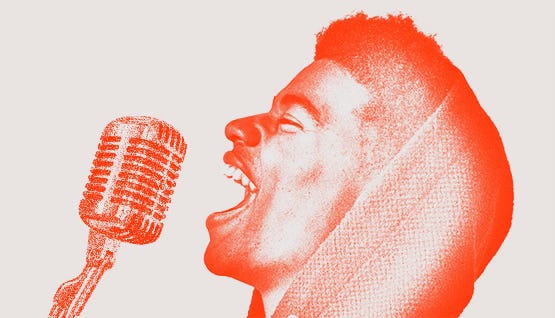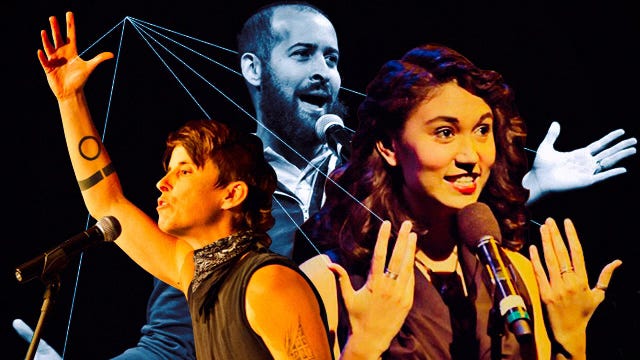Can spoken-word poetry act as an effective tool to express my silence?
According to spoken-word poets, performative poetry is a creative medium that can facilitate self-development, awareness, and emotional release.
The mental health scene has changed since the pandemic, taking a toll on young and older adults' mental health. Since 2020, all of us have learned how to self-isolate to protect our physical being, giving us plenty of time to self-reflect and sit with uncertain emotions about the future.
Maureen Payne, an Academic Liaison Assistant from Oxford Brookes University shares, ‘Reading literature gives opportunity, explores other worlds, feelings, and takes me away from whatever stresses I’m dealing with.’
To delve deeper into performing literature like poetry, a Q&A was conducted with two experienced spoken-word poets, who shared their perspectives on how slam poetry has helped them with processing and releasing emotions.
The Q&A explored the nature of slam poetry that enables us to reach catharsis. Performing poetry involves risk-taking to be on stage, but equally provides a great incentive to understand our egos, and problems that bug us, consequently realising that we do not stand alone when words can resonate with an audience. Emotional resilience can be built through performing on stage, consequently enabling us to increase our self-confidence.
An interview with spoken word poets Ciarán Hodgers and Tina Sederholm
Ciarán Hodgers, a multi-award-winning spoken-word artist based in the UK, shares his journey with slam poetry and how the creative process has played a role in his mental health.
How would you describe spoken-word poetry in three words?
‘Slam poetry in three words is Life. Embodied. Urgent.’
Ciarán elaborates, ‘Life is all about the performance and being present in the room with someone. It can feel visceral for the performer and there’s very little direct contact between you and the audience’ and further expresses, ‘The best performers don’t really perform, they embody it.’
The urgency to respond to our matters through performing is where Ciarán challenges this notion, ‘You’re going to be triggered knowing you’ve gone in knowing you’re going to do this particular poem. Your heart rate will increase and your brain is aware that you’re going to be reading work about something that happened to you, so your body can’t really tell if you’re present. You’re in this trigger state of shit, what is going on?’
‘And then you perform your poem, you have that emotional release after finishing it, no one has died, and you’re still alive.’
How has slam poetry affected your overall self-esteem? When you’re on stage, what emotions do you feel?
‘It’s forced me to understand my relationship to self-esteem, with questions like why does this scare me? Why do I like it so much?’ Ciarán shares. ‘It is best to be a little doubtful, go through all of that emotion, and try to do the work. Be present with it and enjoy those few minutes on stage expressing that.’
What about the verbal aspect of spoken-word poetry, how do you think it acts as a way for one to cope with their emotions?
‘Well, even if people don’t perform and just write poetry, it is a helpful process with the mechanics of your hand moving a pen and using powerful language to talk to yourself, like when you journal. It is like self counselling.’
The physical aspect of expressing yourself also becomes important, as Ciarán says, ‘Sometimes we know how we feel but need to physically move it out of our bodies, and those people who need catharsis often perform it like a ritual act of relieving oneself.’
Is spoken-word poetry trending? If not, do you think it deserves to be recognised more today?
Ciarán questions what is popular, and continues, ‘Slam poetry is not necessarily profitable.’ Further emphasising, ‘This art form is also struggling to come back since the pandemic because it’s a live art form and that’s criminally underfunded and under-supported.’
‘Slam became a style and genre of its own, but poetry itself is the most popular it’s ever been in modern society, overall I think it’s been down to spoken word poets as we have opened the door to a lot of people to re-engage with poetry,’ says Ciarán, suggesting the various ways spoken word poetry has provided opportunities to other forms of poetic expression.
The accessibility of slam poetry enables more individuals to try performative poetry, as Ciarán says, ‘We’re using our own voices, accents, and playing with it to engage with people. It feels more accessible because we all have our own voice.’
Would you encourage others to take on slam poetry as a way to cope with their mental health then?
Ciarán concludes the reality of trying performative poetry, stating ‘I don’t think anything can go wrong. It’s not going to cure anything, mental health is a spectrum. But it can alleviate some emotional and mental distress.’
He further explains, ‘Why would you willingly do it if there wasn’t a payoff for you emotionally? You’re not going to appear cool just because you’ve said something to an audience. The incentive is the way it brings emotional value. You will find the most loving community who will know it’s your first time, or they might just ask you.’
Tina Sederholm, another UK-based spoken-word poet shares what slam poetry is truly about, stating:
‘Our purpose here isn’t to discover how powerful we are. We might be told our emotions make us weak, but this is actually where our strength lies. And if you’re not scared, you’re not going to bring your best game.’
In conclusion, spoken-word poetry might be a risk worth taking with the accessibility of language, finding supportive communities that boost self-esteem, and offering a deeper understanding of one's problems and feelings. Although spoken-word poetry is not seen as profitable post-pandemic, slam poetry incentivises emotional value and purpose, and provides freedom on stage for one to decide how they choose to perform based on how they naturally tune into certain emotions. If you’ll still be alive, why not give it a shot?




